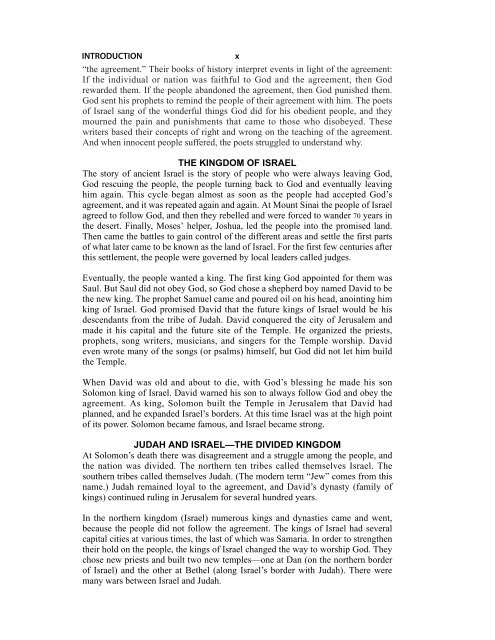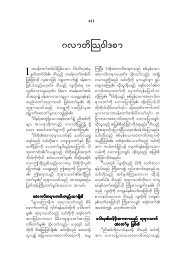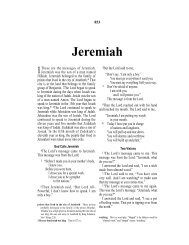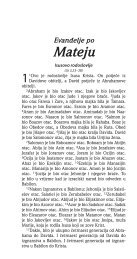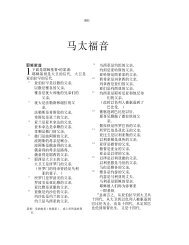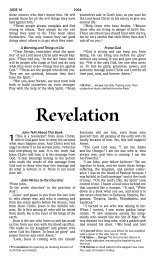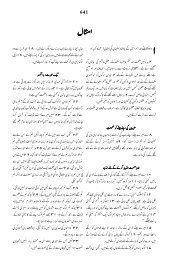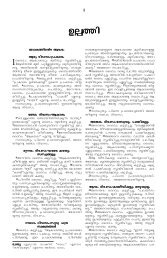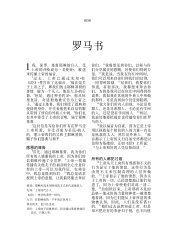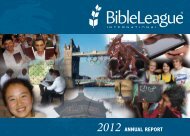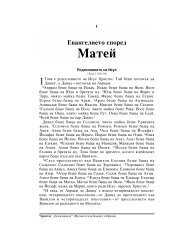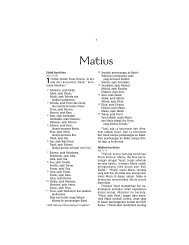English Version for the Deaf
English Version for the Deaf
English Version for the Deaf
Create successful ePaper yourself
Turn your PDF publications into a flip-book with our unique Google optimized e-Paper software.
INTRODUCTION x<br />
“<strong>the</strong> agreement.” Their books of history interpret events in light of <strong>the</strong> agreement:<br />
If <strong>the</strong> individual or nation was faithful to God and <strong>the</strong> agreement, <strong>the</strong>n God<br />
rewarded <strong>the</strong>m. If <strong>the</strong> people abandoned <strong>the</strong> agreement, <strong>the</strong>n God punished <strong>the</strong>m.<br />
God sent his prophets to remind <strong>the</strong> people of <strong>the</strong>ir agreement with him. The poets<br />
of Israel sang of <strong>the</strong> wonderful things God did <strong>for</strong> his obedient people, and <strong>the</strong>y<br />
mourned <strong>the</strong> pain and punishments that came to those who disobeyed. These<br />
writers based <strong>the</strong>ir concepts of right and wrong on <strong>the</strong> teaching of <strong>the</strong> agreement.<br />
And when innocent people suffered, <strong>the</strong> poets struggled to understand why.<br />
THE KINGDOM OF ISRAEL<br />
The story of ancient Israel is <strong>the</strong> story of people who were always leaving God,<br />
God rescuing <strong>the</strong> people, <strong>the</strong> people turning back to God and eventually leaving<br />
him again. This cycle began almost as soon as <strong>the</strong> people had accepted God’s<br />
agreement, and it was repeated again and again. At Mount Sinai <strong>the</strong> people of Israel<br />
agreed to follow God, and <strong>the</strong>n <strong>the</strong>y rebelled and were <strong>for</strong>ced to wander 70 years in<br />
<strong>the</strong> desert. Finally, Moses’ helper, Joshua, led <strong>the</strong> people into <strong>the</strong> promised land.<br />
Then came <strong>the</strong> battles to gain control of <strong>the</strong> different areas and settle <strong>the</strong> first parts<br />
of what later came to be known as <strong>the</strong> land of Israel. For <strong>the</strong> first few centuries after<br />
this settlement, <strong>the</strong> people were governed by local leaders called judges.<br />
Eventually, <strong>the</strong> people wanted a king. The first king God appointed <strong>for</strong> <strong>the</strong>m was<br />
Saul. But Saul did not obey God, so God chose a shepherd boy named David to be<br />
<strong>the</strong> new king. The prophet Samuel came and poured oil on his head, anointing him<br />
king of Israel. God promised David that <strong>the</strong> future kings of Israel would be his<br />
descendants from <strong>the</strong> tribe of Judah. David conquered <strong>the</strong> city of Jerusalem and<br />
made it his capital and <strong>the</strong> future site of <strong>the</strong> Temple. He organized <strong>the</strong> priests,<br />
prophets, song writers, musicians, and singers <strong>for</strong> <strong>the</strong> Temple worship. David<br />
even wrote many of <strong>the</strong> songs (or psalms) himself, but God did not let him build<br />
<strong>the</strong> Temple.<br />
When David was old and about to die, with God’s blessing he made his son<br />
Solomon king of Israel. David warned his son to always follow God and obey <strong>the</strong><br />
agreement. As king, Solomon built <strong>the</strong> Temple in Jerusalem that David had<br />
planned, and he expanded Israel’s borders. At this time Israel was at <strong>the</strong> high point<br />
of its power. Solomon became famous, and Israel became strong.<br />
JUDAH AND ISRAEL—THE DIVIDED KINGDOM<br />
At Solomon’s death <strong>the</strong>re was disagreement and a struggle among <strong>the</strong> people, and<br />
<strong>the</strong> nation was divided. The nor<strong>the</strong>rn ten tribes called <strong>the</strong>mselves Israel. The<br />
sou<strong>the</strong>rn tribes called <strong>the</strong>mselves Judah. (The modern term “Jew” comes from this<br />
name.) Judah remained loyal to <strong>the</strong> agreement, and David’s dynasty (family of<br />
kings) continued ruling in Jerusalem <strong>for</strong> several hundred years.<br />
In <strong>the</strong> nor<strong>the</strong>rn kingdom (Israel) numerous kings and dynasties came and went,<br />
because <strong>the</strong> people did not follow <strong>the</strong> agreement. The kings of Israel had several<br />
capital cities at various times, <strong>the</strong> last of which was Samaria. In order to streng<strong>the</strong>n<br />
<strong>the</strong>ir hold on <strong>the</strong> people, <strong>the</strong> kings of Israel changed <strong>the</strong> way to worship God. They<br />
chose new priests and built two new temples—one at Dan (on <strong>the</strong> nor<strong>the</strong>rn border<br />
of Israel) and <strong>the</strong> o<strong>the</strong>r at Be<strong>the</strong>l (along Israel’s border with Judah). There were<br />
many wars between Israel and Judah.


